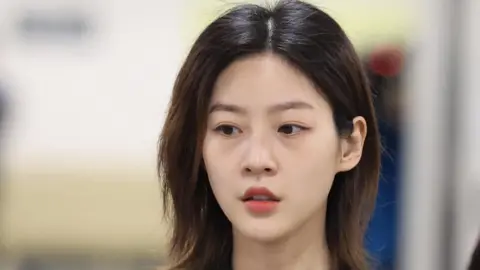Kim Sae-ron’s death exposes South Korea’s celebrity culture

 EPA
EPAActress Kim Sae-ron‘s death in an apparent suicide has renewed criticism of South Korea’s entertainment industry, which churns out stars but also subjects them to immense pressure and scrutiny.
Kim, 24, had been bombarded with negative press coverage and hate online after a drink-driving conviction in 2022. She became so unpopular, scenes featuring her were edited out of shows.
The circumstances leading to her death are depressingly familiar, experts say. Some other celebrities who had their careers upended by cyberbullying also ended up taking their own lives.
As Kim was laid to rest on Wednesday, analysts say they are not optimistic her death will lead to any meaningful change.
South Korea’s entertainment industry is enjoying massive popularity.
Today, there are more than an estimated 220 million fans of Korean entertainment around the world – that’s four times the population of South Korea.
But there is also increasing spotlight on the less glamorous side of the entertainment industry.
South Korea is known for its hyper-competitive culture in most spheres of life – from education to career. It has one of the highest suicide rates among developed countries. While its overall suicide rate is falling, deaths of those in their 20s are rising.
This pressure is heightened in the case of celebrities. They face immense pressure to be perfect, and are subjected to the demands of obsessive “super fans” who can make or break careers.
That is why even the slightest perceived misstep can be career ending.
“It is not enough that the celebrities be punished by the law. They become targets of relentless criticism,” Korean culture critic Kim Hern-sik told the BBC.
He referred to K-pop artists Sulli and Goo Hara, who died by suicide in 2019 after long battles with internet trolls, even though they did not have known brushes with the law.
Sulli had offended fans for not conforming to the K-pop mould, while an internet mob had targeted Goo Hara over her relationship with an ex-boyfriend.
‘A real life Squid Game’
Cyberbullying has also become a money-making gig for some, Korean culture critic Kim Hern-sik told the BBC.
“YouTubers get the views, forums get the engagement, news outlets get the traffic. I don’t think [Kim’s death] will change the situation.
“There needs to be harsher criminal punishment against leaving nasty comments,” he says.
Kim Sae-ron’s father has blamed a YouTuber for her death, claiming the controversial videos they published caused her deep emotional distress.
Others have pointed fingers at some local media outlets, who reportedly fuelled public animosity against Kim by reporting the unverified claims.
“This cycle of media-driven character assassination must stop,” civic group Citizens’ Coalition for Democratic Media said in a statement on Tuesday.
Na Jong-ho, a psychiatry professor at Yale University, likened the spate of celebrity deaths in South Korea to a real-life version of Squid Game, the South Korean Netflix blockbuster which sees the indebted fighting to the death for a huge cash prize.
“Our society abandons those who stumble and moves on as if nothing happened.. How many more lives must be lost before we stop inflicting this destructive, suffocating shame on people?” he wrote on Facebook.
“Drunk driving is a big mistake. There would be a problem with our legal system if that goes unpunished. However, a society that buries people who make mistakes without giving them a second chance is not a healthy one,” Prof Na added.
Last year, the BBC reported on how “super fans” in the notorious K-pop industry try to dictate their idols’ private lives – from their romantic relationships to their daily activities outside of work – and can be unforgiving when things go off script.
It is no surprise that Kim Sae-ron chose to withdraw from the public eye after her DUI conviction, for which she was fined 20 million won (£11,000) in April 2023.
It is worth noting however, that not all public figures are subject to the same treatment. Politicians, including opposition leader Lee Jae-myung, also have past drink-driving convictions but have been able to bounce back – polls show Lee is now the country’s top presidential contender.
In South Korea, it is “extremely tough” for artistes to recover when they do something that puts a crack in their “idol” image, says K-pop columnist Jeff Benjamin.
He contrasts this to entertainment industries in the West, where controversies and scandals sometimes even “add a rockstar-like edge” to celebrities’ reputations.
“While no one cheers when a Hollywood celebrity is arrested for DUI (drinking under the influence of alcohol or drugs) or sent to jail for significant crimes, it’s not necessarily career-ending,” he says.
While the Korean entertainment industry has made moves to address artistes’ mental wealth concerns, it is unclear how effective these have been.
Real change can only happen when there is no more financial or attention incentives to continue with such intrusive reporting, says Mr Benjamin.
If you have been affected by any of the issues in this story you can find information and support on the BBC Actionline website here.
Additional reporting by Jake Kwon in Seoul
World News || Latest News || U.S. News
Source link



